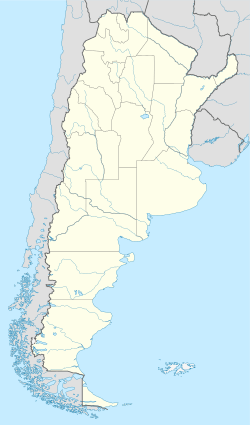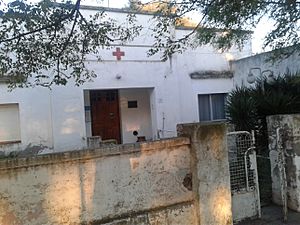Bajo Hondo facts for kids
Quick facts for kids
Bajo Hondo
|
|
|---|---|
|
Town
|
|
| Country | |
| Province | |
| Partido | Coronel Rosales |
| Founded | 1891 |
| Area | |
| • Total | 0.26 km2 (0.10 sq mi) |
| Elevation | 80 m (260 ft) |
| Area code(s) | 02932 |
Bajo Hondo is a small town in the south of Buenos Aires Province, Argentina. It is about 22 kilometers (14 miles) from Punta Alta and 30 kilometers (19 miles) from Bahía Blanca. The town is located along National Highway N3, within the Coronel Rosales Municipality.
Contents
People in Bajo Hondo
In 2010, Bajo Hondo had 164 residents. This number was just slightly less than in 2001, when 165 people lived there.
History of Bajo Hondo
How Bajo Hondo Started
One of the first people to help start Bajo Hondo was Gustavo Coulembier from Belgium. He bought land in 1883 and started a farm called "La Sidonia."
Many towns in this area, including Bajo Hondo, began because of train stations. These stations were built by a British company called the Buenos Aires Great Southern Railway (BAGSR). Their railway line was known as "Ferrocarril del Sur," which means "Railway of the South."
The First Train Station
The BAGSR opened the Bajo Hondo train station in 1891. This is when the town officially began. The name "Bajo Hondo" comes from the Spanish word "Bajo," meaning "down." Local people used this word to describe a slope near where the train station was built.
A Second Railway Line
In 1910, a French company built another railway line. This line connected Rosario (in the north) to Bahia Blanca (in the south). It was called the "Ferrocarril Rosario - Puerto Belgrano." This new railway also passed through Bajo Hondo. The company built a second station only one kilometer away from the first one.
Railways Become Public
In 1948, the government of Argentina took over both railway lines. They changed their names to "Ferrocarril General Roca."
In the early 1900s, trains were very important for moving people and goods. They were especially key for sending farm products to ports for export.
Growth of the Town
In the first few decades of the 20th century, Bajo Hondo grew a lot. This was because of farming and the two railway lines. More people meant the town needed public services. Schools, hospitals, churches, post offices, and police stations were built. People also formed co-operatives and social clubs.
Bajo Hondo Today
Several things have caused the population of Bajo Hondo to shrink:
- New machines in farming meant fewer people were needed for work.
- There were not enough plans to help rural areas grow.
- Trains stopped carrying passengers and only moved cargo.
Because of these changes, many people moved away from Bajo Hondo. They went to other towns and cities to find jobs.
Images for kids
See also
 In Spanish: Bajo Hondo para niños
In Spanish: Bajo Hondo para niños
 | Selma Burke |
 | Pauline Powell Burns |
 | Frederick J. Brown |
 | Robert Blackburn |





